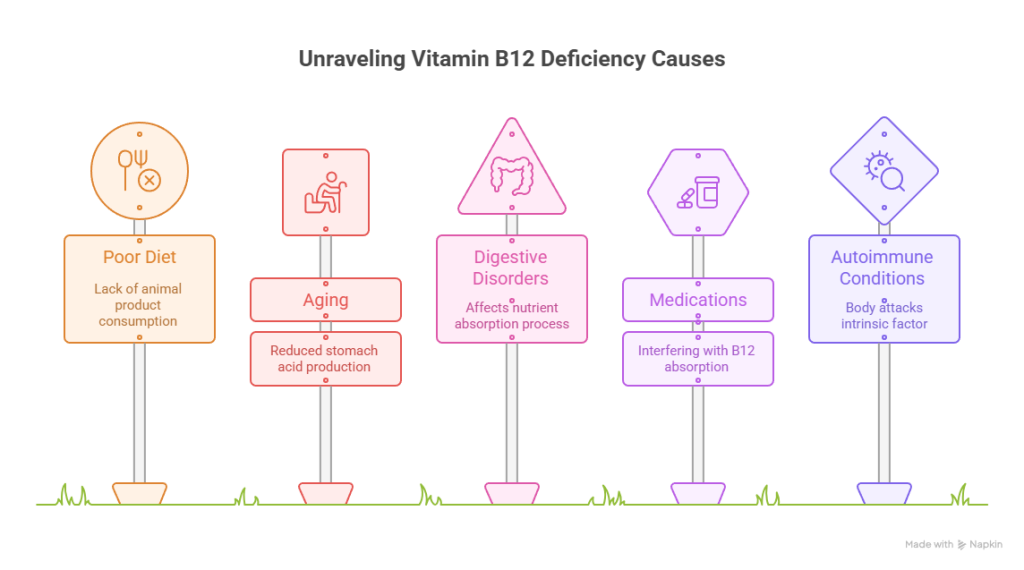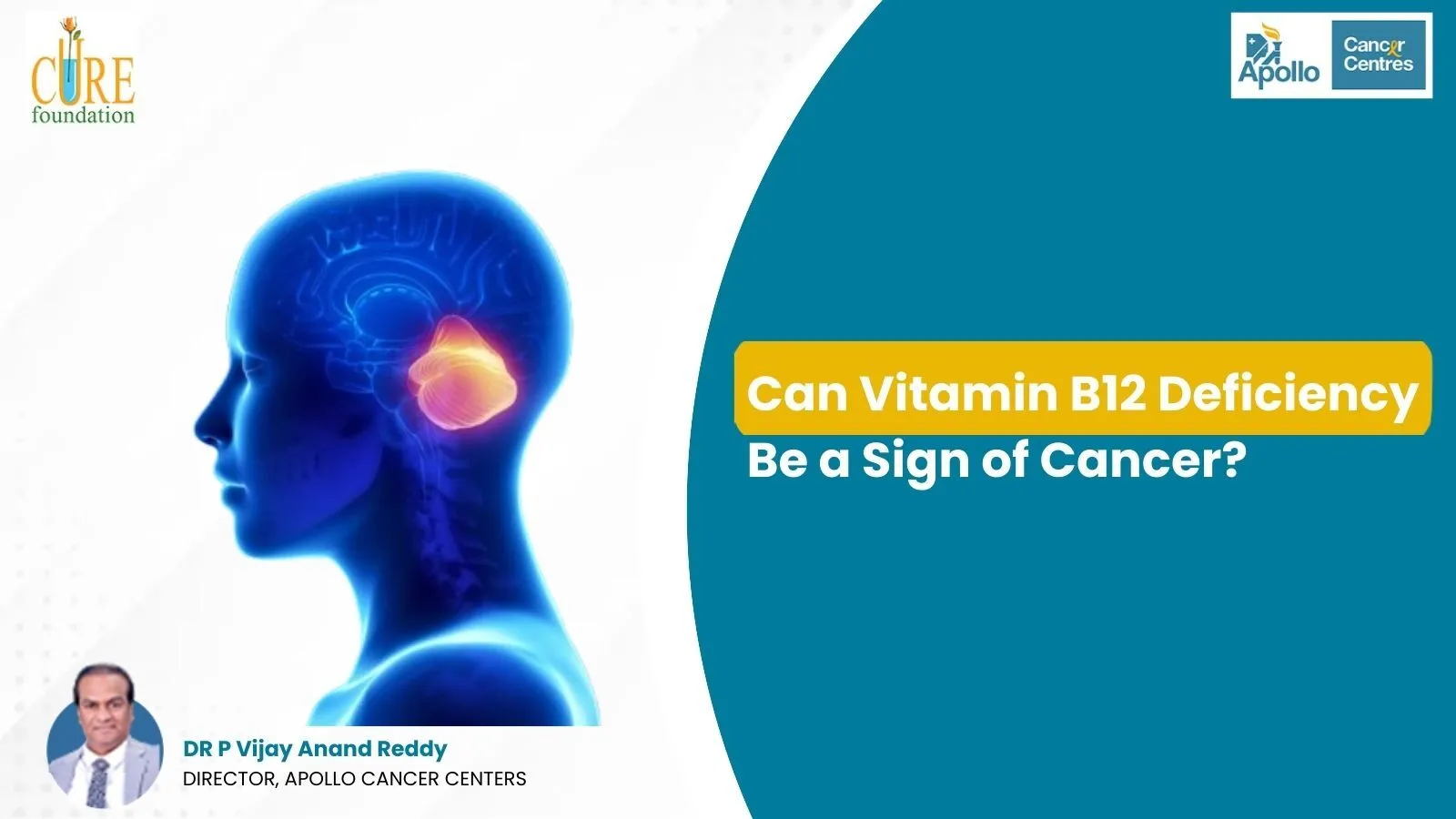Vitamin B12, also known as cobalamin, is one of the body’s most important nutrients. It supports red blood cell formation, helps in DNA synthesis, and plays a key role in brain and nerve function. When levels drop, the effects can be wide-ranging, from fatigue and weakness to memory loss and difficulty in coordination.
Most people think of deficiency as being linked to diet, aging, or digestive issues. But the critical question many are now asking is: Can Vitamin B12 Deficiency Be a Sign of Cancer? This question is not just theoretical—it has real clinical importance. In some cases, persistent low B12 levels are not caused by lifestyle factors but by underlying cancers that affect absorption, storage, or usage of the vitamin.
Understanding Vitamin B12 and Its Role in the Body
To understand why doctors ask Can Vitamin B12 Deficiency Be a Sign of Cancer?, we first need to look at how this nutrient works in the body. Vitamin B12 is found in animal-based foods like meat, eggs, and dairy. For the body to absorb it properly, the stomach produces a protein called intrinsic factor, which helps transport B12 into the small intestine.
When this process is smooth, most people maintain healthy levels of energy. But when something disrupts the system—whether due to poor diet, autoimmune disease, or in some cases, cancer—the deficiency can become severe. Symptoms may start with tiredness, numbness, and pale skin, but without treatment, they can progress to anemia, nerve damage, and long-term health problems.
Common Causes of Vitamin B12 Deficiency

In most cases, low vitamin B12 is explained by everyday factors. Understanding these helps us separate simple deficiencies from those that may raise the more serious question: Can Vitamin B12 Deficiency Be a Sign of Cancer?
Some common causes include:
- Poor diet – especially in people who avoid animal products such as meat, eggs, or dairy.
- Aging – as people get older, the stomach produces less acid, reducing absorption.
- Digestive disorders – conditions like Crohn’s disease or celiac disease affect absorption.
- Medications – certain drugs for diabetes or acid reflux can interfere with B12 absorption.
- Autoimmune conditions – such as pernicious anemia, where the body attacks intrinsic factor.
While these are typical causes, not all cases fit neatly into these categories. When deficiencies remain unexplained despite addressing diet and lifestyle, doctors must ask a deeper question: Can Vitamin B12 Deficiency Be a Sign of Cancer?
Can Vitamin B12 Deficiency Be a Sign of Cancer? – The Connection Explained
When the usual causes don’t explain persistent low B12 levels, the next step is to consider hidden conditions. Here, the question Can Vitamin B12 Deficiency Be a Sign of Cancer? becomes extremely important.
Certain cancers can disrupt the way the body absorbs, stores, or uses vitamin B12. For example:
- Stomach cancer can damage the stomach lining, affecting intrinsic factor production.
- Intestinal cancers may block absorption areas in the small intestine.
- Liver cancer reduces the body’s storage capacity for B12.
- Blood cancers such as leukemia can indirectly affect B12 metabolism.
In each of these cases, the deficiency isn’t just about diet—it may be a symptom of something far more serious. That is why doctors take persistent and unexplained low B12 levels seriously, often recommending advanced tests to rule out underlying malignancies.
How Cancer Affects Vitamin B12 Absorption and Storage
One of the strongest reasons doctors ask Can Vitamin B12 Deficiency Be a Sign of Cancer? is that cancers can interfere with how the body processes and stores this vital nutrient.
Here’s how:
- Stomach cancers damage the lining of the stomach, which reduces the production of intrinsic factor—the protein necessary for B12 absorption.
- Intestinal cancers create blockages or damage in the small intestine, stopping B12 from being absorbed into the bloodstream.
- Liver cancer disrupts the body’s natural storage system, since the liver is the main organ that holds vitamin B12 reserves.
- Chemotherapy and radiation therapy damage the digestive lining, further limiting absorption.
In these cases, the deficiency isn’t caused by diet or aging. Instead, the lack of B12 becomes a hidden warning sign, making the question Can Vitamin B12 Deficiency Be a Sign of Cancer? more relevant than ever.
The Diagnostic Journey: From Symptoms to Testing
When patients show signs like extreme fatigue, pale skin, or numbness, doctors often begin with a simple blood test. If B12 levels are low, supplements are usually prescribed. But when the patient doesn’t improve, it leads to a deeper investigation: Can Vitamin B12 Deficiency Be a Sign of Cancer?
To find the root cause, doctors may recommend:
- Advanced blood tests, such as methylmalonic acid (MMA) and homocysteine levels.
- Intrinsic factor antibody tests to check if absorption issues are autoimmune-related.
- Endoscopy or colonoscopy to detect blockages, ulcers, or tumors.
- CT, MRI, or PET scans to look for cancers in the stomach, intestine, or liver.
This diagnostic process helps doctors separate simple nutritional deficiencies from those linked to more serious conditions like cancer. It’s why persistent B12 issues should never be ignored.
Treatment Approaches: More Than Just Supplements
Supplements alone may improve lab results temporarily, but without investigating the root cause, patients risk worsening disease. Oncologists like Dr. Vijay Anand Reddy, widely regarded as one of the best oncologist in India, highlight that persistent deficiencies should never be ignored. Treating only the symptoms without identifying underlying causes, such as cancer, can delay crucial care.
For patients where cancer is involved, treatment often combines:
- B12 injections or IV therapy to restore immediate levels.
- Nutritional support tailored for cancer patients during chemotherapy or radiation.
- Cancer-focused treatments such as surgery, chemotherapy, or targeted therapy.
This twofold approach—treating both the deficiency and the cancer-ensures patients get complete care. Supplements alone may improve lab results temporarily, but without investigating the root cause, patients risk worsening disease.
Psychological Impacts of B12 Deficiency in Cancer Patients
Beyond physical symptoms, B12 deficiency can also have a psychological toll. Patients often report depression, irritability, memory loss, and mood swings. When paired with cancer, these symptoms can feel overwhelming.
This is why doctors often revisit the question Can Vitamin B12 Deficiency Be a Sign of Cancer? When mental and physical health deteriorate together. Low B12 not only impacts energy and nerve function, but also affects the brain’s ability to regulate mood and cognition.
Supporting mental health is just as important as physical treatment. Counseling, support groups, and stress management techniques can make a significant difference in how patients cope. Managing these challenges holistically improves both recovery outcomes and quality of life.
When to Seek Expert Help
Many people recover from vitamin B12 deficiency with supplements, but sometimes the problem persists even after treatment. This is when the question Can Vitamin B12 Deficiency Be a Sign of Cancer? becomes critical. If fatigue, dizziness, tingling in the hands or feet, or digestive issues continue despite normal interventions, it may indicate something deeper.
You should seek expert help if:
- Your symptoms persist despite injections or supplements.
- You are not a vegetarian or vegan, yet your B12 levels remain low.
- You experience rapid weight loss, unexplained anemia, or frequent digestive issues.
- You have a family history of gastrointestinal or liver cancers.
- Blood tests repeatedly show low vitamin B12 without a clear cause.
In these situations, consulting an oncologist or gastroenterologist is essential. Early evaluation prevents delays in detecting serious underlying conditions.
Prevention and Regular Monitoring
Prevention is always better than a cure, especially when dealing with possible cancer risks. That’s why the question Can Vitamin B12 Deficiency Be a Sign of Cancer? should always be kept in mind during regular check-ups.
Simple steps for prevention and monitoring include:
- Getting routine blood tests if you’re over 40 or have risk factors.
- Eating a balanced diet rich in B12 sources, such as meat, eggs, and dairy.
- Treating digestive issues like ulcers or chronic acidity early.
- Follow up with your doctor if B12 deficiency persists without explanation.
- Staying proactive about cancer screenings when deficiencies don’t improve.
By combining healthy lifestyle habits with timely medical monitoring, people can catch potential warning signs early. Detecting problems before they progress ensures better health outcomes and peace of mind.
Conclusion: Why This Question Matters
Your health should never be left to chance. If you or a loved one experiences unexplained B12 deficiency, seek expert advice immediately. Consulting specialists such as Dr. Vijay Anand Reddy, recognized among the best oncologist in India, ensures accurate diagnosis and timely treatment. Asking the right questions at the right time may be the key to saving a life.
Cancers of the stomach, intestines, liver, and even blood can affect how vitamin B12 is absorbed and stored. Ignoring this link can delay diagnosis and treatment. That’s why regular monitoring, thorough testing, and specialist consultations are so important. Early detection not only prevents complications but can also change the course of a patient’s life.
Your health should never be left to chance. If you or a loved one experiences unexplained B12 deficiency, seek expert advice immediately. Asking the right questions at the right time may be the key to saving a life.
Frequently Asked Questions (FAQs):
Q1. Can Vitamin B12 Deficiency Be a Sign of Cancer?
Yes, in some cases. While many deficiencies are caused by diet or age, unexplained and persistent deficiencies may signal cancers affecting absorption or storage.
Q2. Which cancers are linked to vitamin B12 deficiency?
Stomach, intestinal, liver, and certain blood cancers can interfere with B12 absorption and regulation.
Q3. How do doctors check if cancer is the cause of B12 deficiency?
They may recommend endoscopy, colonoscopy, CT or MRI scans, and antibody tests if basic supplements don’t improve the deficiency.
Q4. Is it always cancer when B12 levels are low?
No, most people improve with supplements or diet changes. But if symptoms persist, doctors must consider the possibility of cancer.
Q5. What are the warning signs that B12 deficiency may be more serious?
Unexplained anemia, persistent fatigue, digestive issues, weight loss, or neurological problems should be investigated thoroughly.

